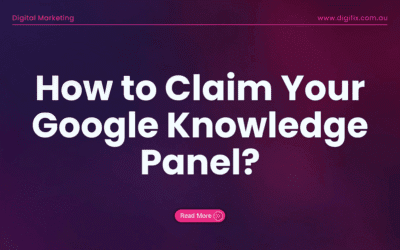This is Your Ultimate Guide to Google Knowledge Panel for Businesses.
Have you ever Googled a famous person, brand, or company and noticed a neatly organized box of information appearing on the right side of your screen (or at the top if you are using a mobile device)? That is a Google Knowledge Panel. It’s a powerful tool that helps users find quick, verified facts about famous entities without clicking through multiple websites.
But what exactly is a Google Knowledge Panel? How does it work? More importantly, how do you get a Google Knowledge Panel for your business? This guide answers all those questions in detail.
What is a Google Knowledge Panel?
A Google Knowledge Panel is an information box that appears in Google search results when a user searches for an entity (such as a business, person, place, or organisation) that Google recognises. Here’s what a knowledge panel looks like:

These panels are powered by Google’s Knowledge Graph, a vast database launched in 2012 that collects facts from trusted sources across the web.
For example, if you search for “Steve Jobs,” you’ll see a panel that includes his biography, birth and death dates, notable achievements, and links to related figures. If you search for a company like “Nike,” you might see details like the company’s logo, headquarters, founding date, CEO, and social media profiles.
In short, Google Knowledge Panels offer a snapshot of the most relevant, factual information about an entity—all in one place.
Where Does the Information Come From?
Google pulls the data in Knowledge Panels from multiple trusted sources including:
- Wikipedia and Wikidata
- Official websites
- Google Business Profiles
- Social media profiles
- Government records
- Third-party databases like Crunchbase
- Structured data (schema markup) on websites
Images in a Knowledge Panel typically come from Google Images, unless the entity has claimed their panel and set a preferred image.
Because Google relies on publicly available data, consistency across your digital presence is crucial. Even a small discrepancy between your website and social media pages can affect the accuracy of your panel.
Features of a Google Knowledge Panel:
The features of a Google Knowledge Panel depend on the type of entity being searched. For a business, a panel may include:
- Business name and logo
- Short description of the business
- Founding date and founders
- Location and headquarters
- Stock price (if publicly traded)
- Subsidiaries or parent companies
- Social media links
- Contact information
- Website link
- “People also search for” section
In the case of individuals, it might include:
- Full name and birthdate
- Notable achievements
- Photos
- Family members
- Education and career highlights
- Books, movies, or projects associated with them
How Does Google Decide Who Gets a Knowledge Panel?
The big question: How does Google decide who gets a Google Knowledge Panel?
Google relies on structured data, consistent branding, and authoritative sources. Entities that are well-documented across the web, mentioned on sites like Wikipedia, Wikidata, and Crunchbase, and have strong domain authority are more likely to be considered.
In short, if Google sees the same reliable information about you or your business in multiple trusted places, it gains confidence in showcasing that data through a Knowledge Panel.
Is Google Knowledge Panel Free?
Yes, Google Knowledge Panels are completely free. However, you can’t pay to get one or apply directly for it. You can only optimise your online presence to increase your chances of being featured.
Why Are Google Knowledge Panels Important?
A Google Knowledge Panel does far more than display surface-level facts. It’s a powerful digital asset that contributes to branding, search visibility, user engagement, and long-term SEO. Let’s break down each reason in detail:
1. Enhances Visibility
In the crowded landscape of Google search results, visibility is everything. A Knowledge Panel takes up prime real estate on the right-hand side of the desktop SERP (Search Engine Results Page) or prominently at the top on mobile.
- When a user searches your name, brand, or business, the Knowledge Panel is likely the first thing they see.
- It’s visually distinct and formatted with bold headers, images, logos, and clickable links—making it stand out from traditional text-based search listings.
- Unlike paid ads, which may be overlooked or blocked, Knowledge Panels are perceived as organic and trustworthy.
High visibility increases brand recall, encourages more clicks to your owned assets (website, social media), and gives you a stronger foothold in branded search results.
2. Boosts Credibility and Trust
Credibility is a cornerstone of digital presence. When Google assigns a Knowledge Panel to an entity, it signals to users that this is a real, notable, and trustworthy figure or brand.
- The panel is populated with data pulled from verified sources like Wikipedia, official websites, and structured schema.
- It presents your information in a factual, unbiased format, reducing doubts about authenticity.
- For public figures, professionals, and brands, this can build authority and public confidence.
For example, imagine a potential investor Googling your startup and seeing a well-organised Knowledge Panel with your company logo, CEO, founding date, and headquarters. It provides a snapshot of legitimacy, often equated with being “Google-verified.”
This kind of perceived trust can influence decision-making—whether someone is choosing to buy your product, collaborate, or even hire your services.
3. Drives Traffic and Engagement
One of the often-overlooked benefits of a Knowledge Panel is that it centralises access to your digital ecosystem.
- Panels typically contain clickable links to your official website, social media profiles, Wikipedia page, or product listings.
- Some panels show recent posts from your social media or news updates, creating opportunities for deeper engagement.
- Mobile users, in particular, appreciate the ability to access key information without scrolling through multiple results.
This convenience translates into higher engagement rates. Users who find what they need quickly are more likely to:
- Visit your site
- Follow you on social platforms
- Engage with your content
- Make a purchase or inquiry
Increased click-through rates (CTR) improve brand awareness and positively impact your website’s performance metrics—time on site, pages per session, and conversion rates.
4. Supports Your SEO Strategy
From an SEO perspective, being featured in a Google Knowledge Panel is a sign of semantic recognition by Google’s Knowledge Graph. This has several technical and strategic implications:
- It means Google understands your brand or persona as a distinct entity, which helps improve entity-based SEO.
- The more accurate, connected, and authoritative your data is across the web, the more trust you build with Google’s algorithms.
- When Google associates your entity with high-authority sources (e.g., Wikipedia, Wikidata, Crunchbase, schema markup on your site), it helps boost your visibility for relevant non-branded keywords.
In addition, the structured nature of Knowledge Panels complements your schema implementation, helping your site become more eligible for:
- Rich snippets
- Featured snippets
- “People also ask” boxes
- Carousel placements
Being indexed as a known entity in the Knowledge Graph can improve your domain authority, influence ranking factors, and set the foundation for long-term SEO success.
How to Get a Google Knowledge Panel for Your Business:
A Google Knowledge Panel appears when Google recognises your brand or entity as significant and trusted enough to show factual information alongside search results. It’s based on entity recognition within the Knowledge Graph, which is Google’s database of well-known people, businesses, places, and things.
Here’s how to position your business as a recognised entity:
- Create a Strong ‘About’ Page (Also Known as Entity Home)
Your About page is the central hub where Google learns about your business. This is often called the “entity home”—the main page that defines and summarises your business identity.
What to include:
- Business Name: Make sure it’s clearly stated at the top of the page.
- Founding Date: Include when the business started.
- Key People: Name the founders, CEO, or key team members.
- Mission Statement: Clearly state your purpose and what makes you different.
- Industry and Services: Define what industry you’re in and detail your services or products.
- Physical Location: Include full address and Google Map embed if applicable.
- Contact Info: Add phone number, email address, and a contact form.
- Social Media Links: Include all official social handles (LinkedIn, Facebook, Instagram, Twitter, etc.).
Google needs a central, trusted source to verify facts about your business. If this data is clear and structured on one dedicated page, it improves your chances of being recognised as an entity worthy of a Knowledge Panel.
- Use Structured Data (Schema Markup)
Schema markup is a form of code (usually JSON-LD) that helps search engines understand your content in a structured, machine-readable way. It enhances your site’s visibility and eligibility for rich results—including Knowledge Panels.
Key Schema Types to Use:
- Organization: For general information about your business.
- LocalBusiness: If you operate from a physical location.
- SameAs: Link your website to your official social media accounts and trusted listings.
- Logo: Help Google correctly identify your brand’s logo.
- ContactPoint: Provide structured contact info for customer support, press, etc.
Tools to help:
- Google’s Structured Data Markup Helper
- Schema.org
- WordPress plugins like Rank Math or Yoast SEO for easy implementation
Schema provides the semantic context Google needs to connect your business with the data it finds across the web. The more structured your information, the more easily Google can recognise and verify it.
- Ensure Consistency Across the Web
Google cross-checks your business information from a wide variety of sources to ensure accuracy. This means you must be consistent everywhere you appear online.
Checklist for consistency:
- Business name, address, and phone number (NAP)
- Founders and executive names
- Industry classification
- Business description and tagline
- Logo and brand visuals
Where to check/update:
- Your website
- Google Business Profile
- Facebook, Instagram, LinkedIn, X (Twitter), YouTube
- Directory listings like Yelp, Yellow Pages, Better Business Bureau
- Press releases and media coverage
Inconsistent information confuses, leading Google to doubt your legitimacy. But when your data is aligned across all platforms, it strengthens your business’s credibility in the eyes of the Knowledge Graph.
- Claim and Optimise Your Google Business Profile (GBP)
Though not the same as a Knowledge Panel, your Google Business Profile (formerly Google My Business) plays a significant role in feeding structured data to Google, especially for local businesses.
Steps to optimise:
- Claim and verify your business at Google Business Profile Manager
- Use your exact business name (no keyword stuffing)
- Add accurate business hours, services, website, and phone number
- Upload high-quality photos of your location, team, and logo
- Choose the correct business categories
- Enable messaging and appointment booking if relevant
- Regularly post updates, offers, and events
- Encourage satisfied customers to leave reviews—and respond to them
Your GBP strengthens your presence in Google’s ecosystem and provides additional signals of legitimacy, which are especially valuable for local businesses looking to earn a Knowledge Panel.
- Get Listed on Authoritative Third-Party Sites
Google heavily relies on trusted data sources to populate Knowledge Panels. These include sites that are widely recognised and monitored for editorial accuracy.
Key platforms to target:
- Wikipedia: If you’re notable enough, create a page following strict editorial guidelines (or get mentioned on related pages).
- Wikidata: Structured data repository linked to Wikipedia. Easier to get listed on than Wikipedia.
- Crunchbase: Ideal for startups, tech companies, and founders. Provides structured company profiles.
- LinkedIn: Google often uses this as a source for leadership information.
- News sites and press coverage: Aim to be featured in recognised media outlets with a backlink to your site.
- Industry-specific directories: E.g., Clutch for agencies, TripAdvisor for restaurants, or Dribbble for creatives.
Google pulls data for Knowledge Panels from trusted databases. Being listed on those platforms improves your visibility and trustworthiness, which can trigger the panel generation process.
If you already have a Wikipedia or Wikidata entry, and structured schema in place, you can try submitting your entity to Google’s Knowledge Graph API. This doesn’t guarantee a panel but can help formally introduce your entity to Google.
Earning a Knowledge Panel is not just about SEO—it’s about building a verified digital identity. While you can’t directly create or control a Knowledge Panel, following the steps above gives Google all the right signals to consider your business as a notable and trustworthy entity.





0 Comments